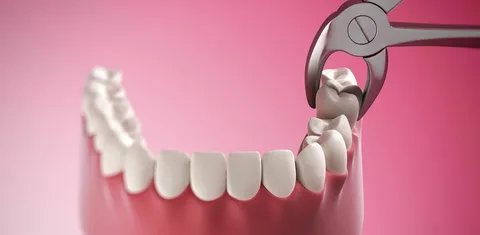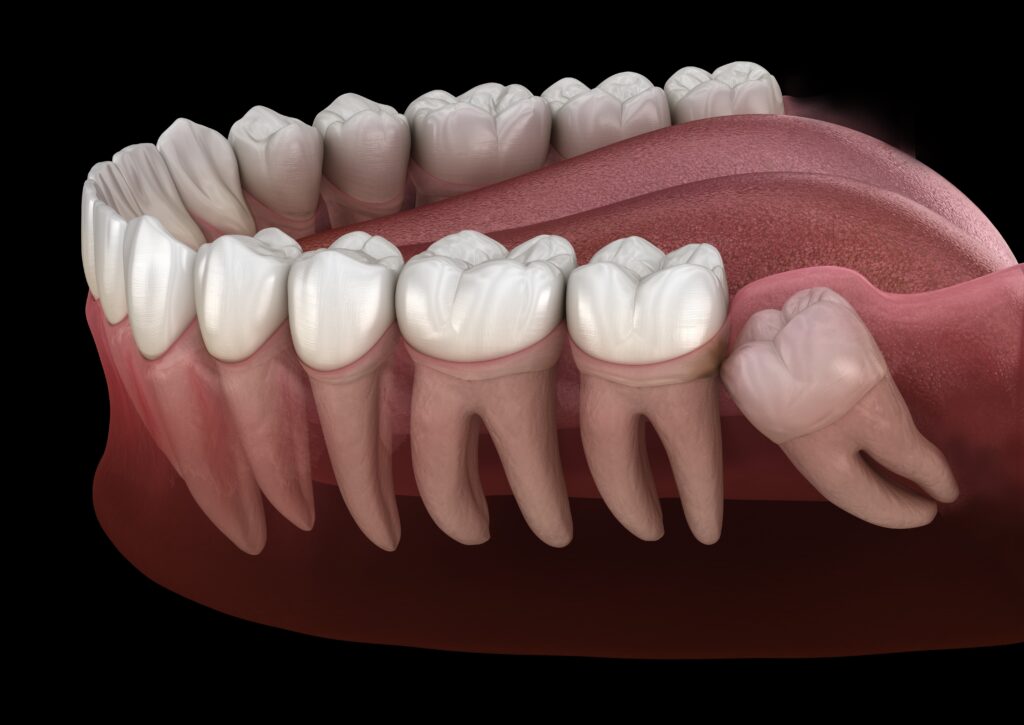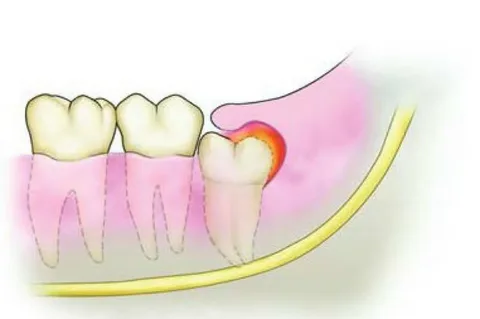TREATMENTS
Wisdom Teeth Extraction Treatment in Lahore
Wisdom Teeth Extraction
Wisdom teeth often emerge in late adolescence or early adulthood, and their eruption can sometimes lead to various dental issues. Wisdom teeth extraction is a common dental procedure to address problems associated with these molars. Here is an overview of wisdom teeth extraction.These teeth are the last set of molars located at the back of the mouth and usually emerge in late adolescence or early adulthood. Wisdom teeth extraction may be recommended for various reasons:

- Functional Impairment
- Aesthetic Concerns
- Speech Difficulties
- Preventing Tooth Migration
- Preserving Bone Health
- Improving Oral Health
- List Item #1
- List Item #2
- List Item #3
Types Of Wisdom Teeth Extraction

Simple Extraction
This type of extraction is performed on wisdom teeth that have fully erupted and are visible in the mouth. The dentist or oral surgeon numbs the area around the tooth with a local anesthetic.

Surgical Extraction
Surgical extraction is necessary when wisdom teeth are impacted, partially erupted, or have complications that make simple extraction impractical. The patient may receive local anesthesia, intravenous sedation, or general anesthesia for comfort

Soft Tissue Impaction Extraction
Soft tissue impaction occurs when the wisdom tooth is partially erupted, and part of it is still covered by gum tissue.An incision is made in the gum to expose the impacted tooth.

Complete Bony Impaction Extraction
In complete bony impaction, the wisdom tooth is fully encased in the jawbone and has not erupte. An incision is made, and a portion of the jawbone may need to be removed to access the tooth.
CAUSES OF WISDOM TEETH EXTRACTION
Wisdom teeth often do not have enough space to fully emerge or align properly in the mouth. This can lead to partial eruption or impaction. Impacted wisdom teeth can cause pain, swelling, and infection. They may also contribute to the misalignment of adjacent teeth. The mouth may not have sufficient space to accommodate the eruption of wisdom teeth.
Impaction
Wisdom teeth often do not have enough space to fully emerge or align properly in the mouth. This can lead to partial eruption or impaction
Overcrowding
The mouth may not have sufficient space to accommodate the eruption of wisdom teeth.
Misalignment
Wisdom teeth may emerge at an angle, causing them to be misaligned with neighboring teeth.
Cysts or Tumors
Cysts or tumors may develop around impacted wisdom teeth. Consequences: These growths can cause damage to the surrounding bone and teeth.
WISDOM TEETH EXTRACTION
Symptoms of Wisdom Teeth Extraction
- Difficulty Eating
- Stiffness
- Bad Breath
- Infection
- Bleeding
- Numbness or Tingling
How To Take Care Missing Teeth
Taking care of your oral health, especially when you have missing teeth, is important to prevent complications and maintain overall well-being. Here are some tips on how to care for missing teeth:
Floss Regularly: Floss between your remaining natural teeth and around dental appliances to remove plaque and prevent gum disease. If you have dental bridges or implants, use floss threaders or interdental brushes for effective cleaning.
Use an Antiseptic Mouthwash: Rinse your mouth with an antiseptic or fluoride mouthwash to help control bacteria and maintain oral hygiene. Consult your dentist for recommendations based on your specific needs.
Visit Your Dentist Regularly: Schedule regular dental check-ups, even if you have missing teeth. Your dentist can monitor the health of your remaining teeth, assess your gum health, and address any concerns promptly.
Consider Dental Appliances If you have missing teeth, your dentist may recommend dental appliances such as bridges, dentures, or implants to restore function and aesthetics. Follow your dentist’s instructions for care and maintenance of these appliances.
FAQs
Wisdom teeth often require extraction due to various reasons such as impaction, overcrowding, misalignment, or the potential for causing pain, infection, or damage to adjacent teeth.
Signs that may indicate the need for wisdom teeth removal include pain, swelling, tenderness in the back of the mouth, difficulty opening the mouth, gum inflammation around the wisdom teeth, and signs of infection.
Options for replacing missing teeth include dental implants, bridges, dentures, and implant-supported dentures. The choice depends on factors like the number of missing teeth, oral health, budget, and individual preferences.
Yes, impacted wisdom teeth can lead to pain, infection, damage to adjacent teeth, and the development of cysts or tumors.
While uncommon, complications may include dry socket, infection, nerve damage, or excessive bleeding. Following postoperative care guidelines helps minimize risks.
Not always, but extraction is often recommended when wisdom teeth pose a risk of complications or adversely impact oral health.

